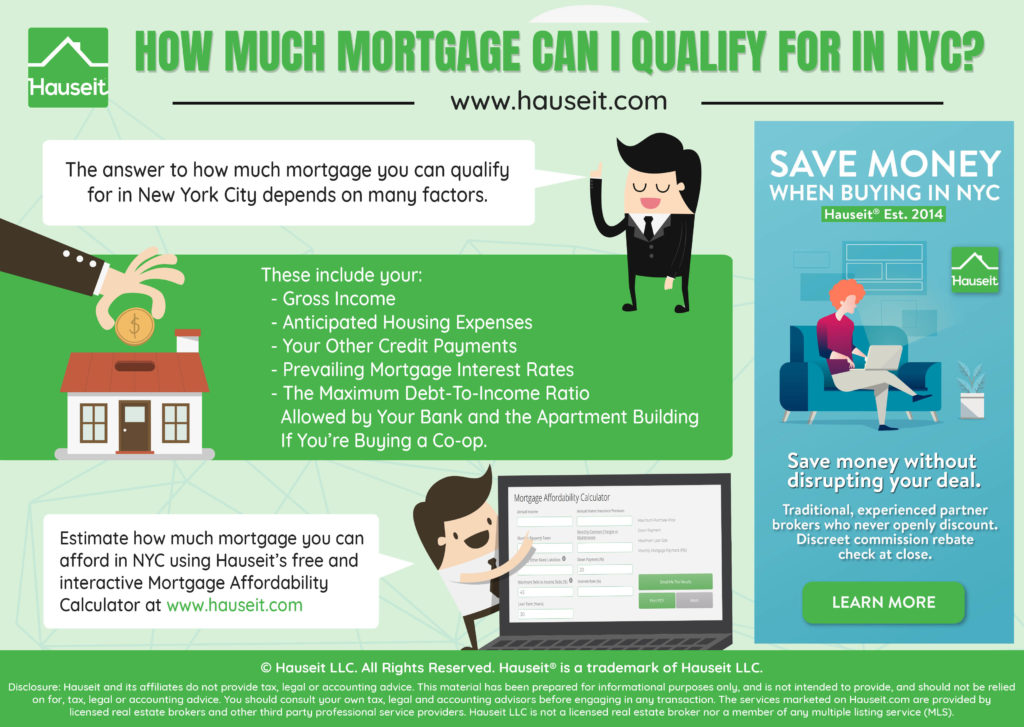The answer to how much mortgage can I qualify for in NYC depends on the amount of gross income you make, your anticipated housing expenses, your other credit payments, prevailing mortgage interest rates and the maximum Debt-to-Income ratio allowed. We’ll go over step by step how to figure out how much mortgage you can get in the following article.
Table of Contents:

The first step to answering how much mortgage can I qualify for in NYC is to find your annual or monthly gross income. Banks will use your gross income figure as an important building block for the very important Debt-to-Income Ratio (DTI ratio).
Why is the DTI ratio important?
Because it determines the maximum amount of housing and other credit expenses you can have vs your gross income.
For example, 43% is a fairly standard maximum DTI ratio used by banks for conforming mortgages. This means that the sum of your housing expenses and other mandatory credit or loan expenses cannot exceed 43% of your gross income.
If you make too little income relative to the anticipated expenses for a hypothetical apartment purchase, then you likely won’t be able to qualify for a mortgage at all.
For example, if you make $60,000 and you are thinking on buying an apartment with $1,000 in monthly common charges, $1,000 in monthly real estate taxes, $1,500 in annual home owner’s insurance premiums and you also have $500 a month in student loan debt, then according to our handy Mortgage Affordability Calculator you would make too little income to qualify for any sort of conforming mortgage at all.
That’s because the sum of these expenses would exceed 43% of your gross income.
Get a 2% Rebate When You Buy
Save thousands on your home purchase with a buyer agent commission rebate from Hauseit
If you’re lucky enough to be asset rich but income poor, then you can still qualify for an asset based loan with many banks in New York City.
For example, one major Wall Street bank headquartered in Midtown Manhattan will lend up to 25% of your liquid assets for a home purchase as of 2018.
As this cycle’s bull market continues, we’re certain that lending standards will loosen and the amount of assets you’ll need to have in order to get an asset based loan will certainly decrease.
Save 2% On Your Home Purchase
Save thousands on your home purchase with a buyer agent commission rebate from Hauseit
This is a great question. What should I assume for housing expenses if I don’t even know how much mortgage can I qualify for in NYC?
The best way around this circular logic is to test a few hypothetical purchases, starting with the maximum amount of home and mortgage you can afford based on how much you have saved for a down payment and anticipated closing costs.
For example, let’s assumed you’ve saved up enough to cover a 20% down payment for a $1,000,000 condo purchase in addition to anticipated closing costs which you’ve calculated through our handy NYC Buyer Closing Cost Calculator.
In this example, you’d assume a mortgage of $800,000 at prevailing interest rates for a standard 30 year, fixed rate mortgage.
Take a look at our article on condo common charges vs co-op maintenance fees for inspiration on what to assume for average monthly carrying charges, or you can use real numbers for an actual listing you would consider buying.
For annual home owner’s insurance, assume something reasonable between $1,000 to $2,000 per year.
Also remember to include any other debt payments you have such as student loan payments, credit card payments and car loan payments. Anything that would show up on your credit report should be included in your expenses total.
Use our handy Mortgage Affordability Calculator to determine whether you make enough income to afford all of these expenses. If not, simply test again with a smaller mortgage or an apartment with fewer monthly carrying charges.
It’s important to understand that just because banks will generally lend up to a 43% DTI ratio does not mean that co-op buildings will agree to it. That’s because many co-op boards in NYC will have their own set of coop financial requirements that are much stricter than the financial requirements of lenders.
For example, many co-op buildings will allow a maximum DTI ratio of 25% to 30% which is much more conservative than the DTI ratio used by banks.
This will result in a significantly smaller loan that you can get.
On the other hand, banks may even make an exception on the DTI ratio if you are otherwise well qualified. A bank may make an exception and still give you a loan that puts you over 43% for the DTI ratio; however, this typically means the loan will be non-conforming and the bank may not be able to sell it in the secondary market to Fannie and Freddie.
If you’re buying a condop or condo, then you most likely will not have to worry about your building having its own set of financial requirements. Be careful though, many condops are really co-ops in disguise. If you’re buying a free-standing or attached house or townhome, then you definitely don’t need to worry as you make the rules for the building you entirely own!
A Full Service Listing for 1%
Sell your home with a traditional full service listing for just one percent commission.
Disclosure: Commissions are not set by law or any Realtor® association or MLS and are fully negotiable. No representation, guarantee or warranty of any kind is made regarding the completeness or accuracy of information provided. Square footage numbers are only estimates and should be independently verified. No legal, tax, financial or accounting advice provided.






